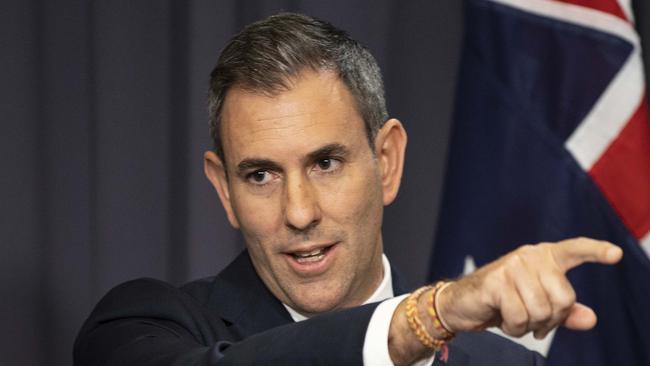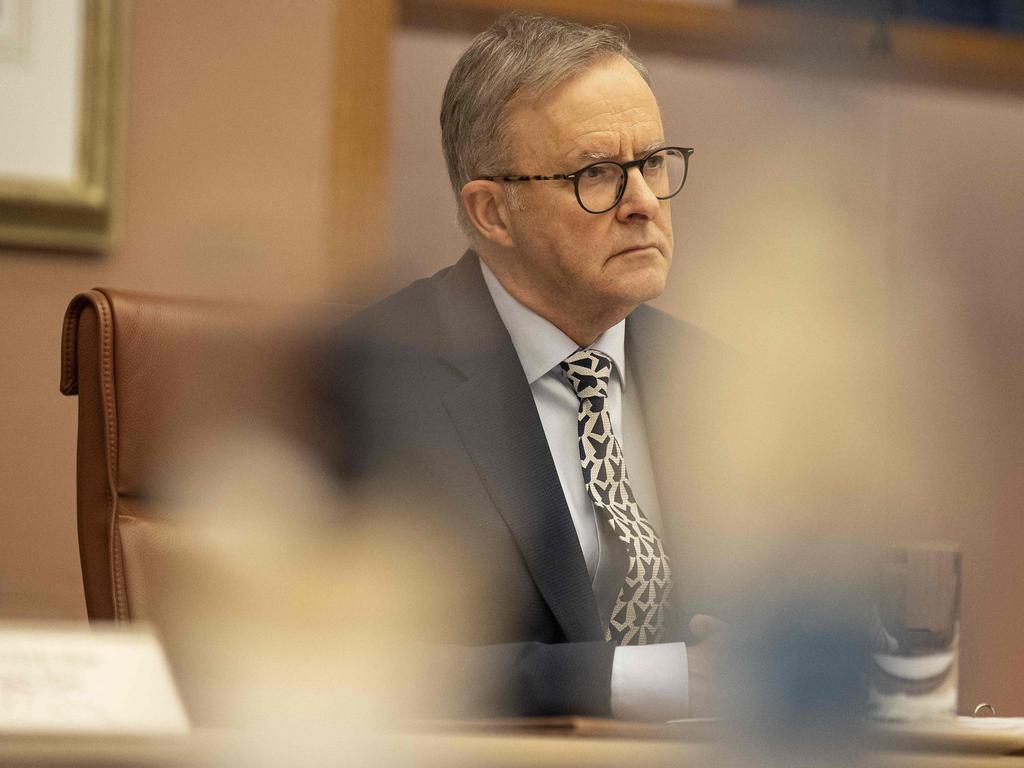NDIS, debt costs surge raise budget pain
Double-digit annual growth in the cost of the NDIS and debt-servicing will heap further pressure on the budget, as Treasury warns of a global downturn hitting exports.

Double-digit annual growth in the cost of the NDIS and debt-servicing will heap further pressure on the Albanese government’s budget, as Treasury warns of a global downturn that will slash $US2 trillion from the world economy by 2024 in a potential hit to Australian exports.
In a speech in Brisbane on Friday, Jim Chalmers will reveal his October budget must navigate spending growth of 12.1 per cent per year for the NDIS and 14 per cent increases in the cost of servicing commonwealth debt over the next four years.
Warning of intensifying fiscal pressures and projected deficits “over the forwards and beyond”, the Treasurer will say that defence spending is forecast to rise by 4.4 per cent a year, hospital funding by 6.1 per cent a year and aged-care assistance by 5 per cent a year out to 2026-27.
In a draft copy of his address, Dr Chalmers said this represented spending that was “either desirable or unavoidable, or both – and must be paid for”. He warned that the government would be forced to make “some difficult decisions with this budget”.
“We must be serious about rebuilding our budget buffers – particularly given the deteriorating global outlook,” he said. “We’ll put a premium on affordable, responsible, sustainable, spending. Not fancy or flashy – but fair and future-focused.”
As the Albanese government mulls the political fallout of breaking an election promise by ditching or modifying the already legislated stage-three tax cuts, Dr Chalmers said his guiding principle would be “following the responsible path — not the path of least resistance”.
“No responsible government could ignore the global context for the coming budget. Here at home, we must be careful not to misalign fiscal and monetary policy,” he said in reference to the UK government’s ill-fated fiscal plan announced two weeks ago that triggered the British pound to slump to its lowest in history.
“The fiscal position we find ourselves in means that we will have to make some difficult decisions with this budget – difficult decisions for difficult times.
“Australia’s existing strengths will help steer us through the coming economic storm.
“But on their own, they aren’t enough to overcome (the) structural and entrenched deficit currently built into the budget – burdened by spending pressures that are constant and compounding.”
While remaining coy on the fate of the third stage of the former government’s tax reform package, Dr Chalmers on Thursday rejected talk of introducing a special levy to capture more of the windfall profits being enjoyed by miners and exporters of liquefied natural gas.
“That’s not something that we’ve been working up for announcement in October,” he said.
The Treasurer also said revisiting the petroleum resource rent tax to capture more revenue was not a priority.
“It's not something that I’ve been working up for October or (the budget in) May,” he said. “We’ve got other issues that we are focused on.”
Dr Chalmers also ruled out an increase to the Medicare levy but said he wanted to work with the states and territories to “make sure that we can adequately fund their health systems”.
Dr Chalmers argued the budget would be about “responsible economic management at home at a time of uncertainty around the world” and again sounded the alarm on the prospect of a “third global slowdown in the last 15 years.”
In addition to the relentless spending pressures the government faces in core areas such as the NDIS and defence, the Treasurer will use his speech to warn Australia could be forced to navigate the fallout from another global recession.
“The hard truth is that these global economic storm clouds are darkening, not clearing,” he said. “The risk of major economy downturns is rising, not receding. And the impact this has on Australia’s economy and budget is hardening, not softening.”
The chaos in energy markets unleashed by Russia’s war in Ukraine and the “steepest, most synchronised global monetary tightening seen in the inflation targeting era” would slash an estimated $US2 trillion from the world economy by the end of 2024, he said.
Ahead of what will be a dour economic update from the International Monetary Fund next week, the upcoming budget will show Treasury’s global growth forecast downgraded by 0.75 percentage points in 2022, 1 percentage point in 2023, and 0.5 percentage points in 2024.
“The rapid price increases induced by war and the pandemic have been responded to with blunt and brutal force by the world’s central banks – the steepest, most synchronised global monetary tightening seen in the inflation targeting era,” he said.
“We aren’t being spared from the deteriorating global outlook. And we shouldn’t hope to escape further storms unscathed.”
But Dr Chalmers pointed towards Australia’s “significant advantages”, such as the lowest unemployment rate in nearly five decades, booming terms of trade and solid economic momentum into at least the middle of the year.
“There are good reasons to be optimistic about the future of our economy and our people – and we are – but first we need to navigate together some tricky terrain – and we will,” he said.
Dr Chalmers said the October 25 budget would also include a new and “credible fiscal strategy that we intend to stick with”.
“No responsible government can ignore high and rising inflation or a deteriorating global situation, or the fact that we’ve got these persistent structural pressures on the budget,” he said.
He pushed back against suggestions he was out of step with Anthony Albanese by frontrunning the debate on the stage-three personal income tax cuts.
Dr Chalmers said he didn’t “need permission (from the Prime Minister) to point out that every budget that we hand down, including the one that I’ll hand down in less than three weeks time, will put a premium on responsible economic management”. He said his commitment was “to do what we can to make sure that our budgets are responsible, affordable, sustainable, and targeted to the economic conditions that we confront”.








To join the conversation, please log in. Don't have an account? Register
Join the conversation, you are commenting as Logout